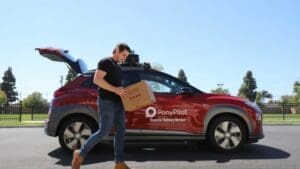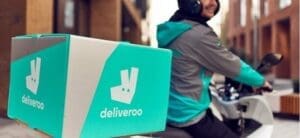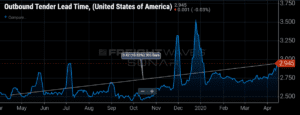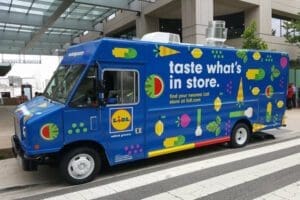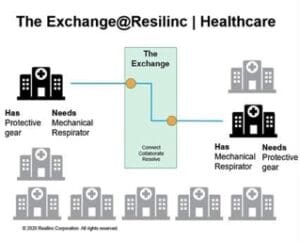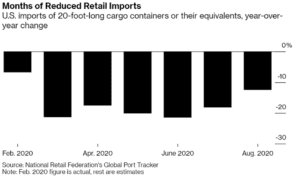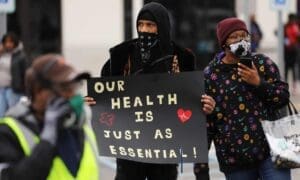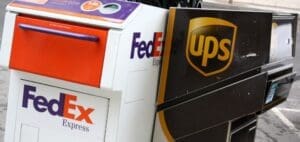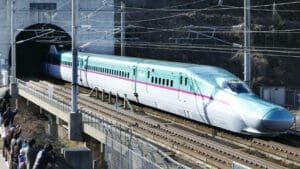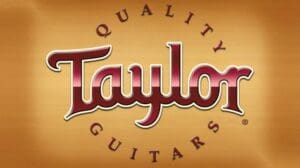 Sustainability has been a hot topic in supply chain and manufacturing circles lately. Earlier this week I saw an article about Taylor Guitars, one of the world’s most well-known makers of acoustic guitars, and how it has been looking at alternatives to using exotic wood for its instruments as regulations around the use of exotic wood has tightened. So now, when customers buy a new Taylor guitar, it may not be made from exotics wood from Guatemala or India; instead, it may be made from a tree off the side of the road in LA. Taylor has been developing a new technique for using urban wood and is now incorporating it into their luxury guitars. While it may not have been Taylor’s first choice, it is still a step in the right direction to protect the world’s forests. And now on to this week’s logistics news.
Sustainability has been a hot topic in supply chain and manufacturing circles lately. Earlier this week I saw an article about Taylor Guitars, one of the world’s most well-known makers of acoustic guitars, and how it has been looking at alternatives to using exotic wood for its instruments as regulations around the use of exotic wood has tightened. So now, when customers buy a new Taylor guitar, it may not be made from exotics wood from Guatemala or India; instead, it may be made from a tree off the side of the road in LA. Taylor has been developing a new technique for using urban wood and is now incorporating it into their luxury guitars. While it may not have been Taylor’s first choice, it is still a step in the right direction to protect the world’s forests. And now on to this week’s logistics news.
- Amazon, Whole Foods, Instacart workers organize a historic mass strike
- Tyson Foods issues meat supply chain warning
- They lived in a factory for 28 days to fight coronavirus
- Apple reportedly delays iPhone 12 mass production by a month
- Automakers adjust to ‘new normal’ as they prepare to reopen plants
- UPS to fly medications by drone to Florida retirement area
- NCDOT looks to drones as coronavirus relief tool
- North American trade deal to take effect on July 1
Over the last few weeks there have been a number of work stoppages and strikes organized by front line workers at some of the largest companies across the country. Today, in a historic move, employees at Amazon, Whole Foods, Instacart, Walmart, FedEx, Target, and Shipt say they will walk off the job to protest their employers’ failure to provide basic protections for frontline workers in the face of coronavirus. In a flyer circulated widely on social media, organizers of the so-called “May Day General Strike” implore customers to boycott Whole Foods, Amazon, Target, and Instacart on May 1. The organizers of the strike have been planning the logistics over Zoom calls for the last few weeks as well as discussing a number of demands, namely personal protective gear, health care benefits, paid leave, and hazard pay. This could certainly make for an interesting day as e-commerce sales continue to boom and shipping times get delayed.
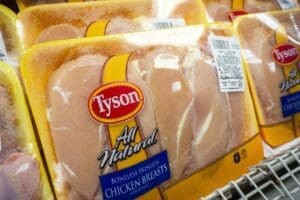 Two weeks ago in my news roundup I mentioned that Smithfield Foods had closed its Sioux Falls pork facility after a spike in COVID-19 cases. The big question was how far reaching food plant closures would be, and what impact it would have on the food supply chain. This week, Tyson Foods said that the food supply chain is breaking. The company warned that “millions of pounds of meat” will disappear from the supply chain as the coronavirus pandemic pushes food processing plants to close. This will lead to product shortages in supermarkets across the country, which in turn could lead to more panic buying and hoarding. Tyson Foods, which employs roughly 100,000 workers, closed its pork plants in Waterloo, IA, and Logansport, IN last week so that workers in those facilities could be tested for the virus. President Trump has invoked the Defense Production Act to keep meatpacking plants open during the coronavirus pandemic.
Two weeks ago in my news roundup I mentioned that Smithfield Foods had closed its Sioux Falls pork facility after a spike in COVID-19 cases. The big question was how far reaching food plant closures would be, and what impact it would have on the food supply chain. This week, Tyson Foods said that the food supply chain is breaking. The company warned that “millions of pounds of meat” will disappear from the supply chain as the coronavirus pandemic pushes food processing plants to close. This will lead to product shortages in supermarkets across the country, which in turn could lead to more panic buying and hoarding. Tyson Foods, which employs roughly 100,000 workers, closed its pork plants in Waterloo, IA, and Logansport, IN last week so that workers in those facilities could be tested for the virus. President Trump has invoked the Defense Production Act to keep meatpacking plants open during the coronavirus pandemic.
 Many people have been going above and beyond the call of duty for the greater good during the coronavirus pandemic. And that’s exactly what 43 employees at Braskem America’s petrochemical plant in Neal, WV did. The plant produces polypropylene, which is needed to make various medical and hygienic items. On March 23, the 43 employees clocked in to work along with toiletries, suitcases, and other essentials, for the longest shift of their lives. Working 12-hour shifts day and night for 28 straight days, sleeping on air mattresses in the processing plant, they produced tens of millions of pounds of the raw materials that will end up in face masks and surgical gowns worn on the front lines of the pandemic.
Many people have been going above and beyond the call of duty for the greater good during the coronavirus pandemic. And that’s exactly what 43 employees at Braskem America’s petrochemical plant in Neal, WV did. The plant produces polypropylene, which is needed to make various medical and hygienic items. On March 23, the 43 employees clocked in to work along with toiletries, suitcases, and other essentials, for the longest shift of their lives. Working 12-hour shifts day and night for 28 straight days, sleeping on air mattresses in the processing plant, they produced tens of millions of pounds of the raw materials that will end up in face masks and surgical gowns worn on the front lines of the pandemic.
 During a typical release cycle, Apple is able to mass produce its new iPhones over the summer for its unveiling at its September conference. This enables the company to begin shipping the phones right after the launch. However, Apple is reportedly delaying mass production of its upcoming iPhone 12 handsets by around a month. The coronavirus pandemic has disrupted Apple’s supply chain to that point that mass production cannot begin on time. While the delay may not make an impact on when Apple launches the new iPhone, it could certainly cause a shortage when it hits the market.
During a typical release cycle, Apple is able to mass produce its new iPhones over the summer for its unveiling at its September conference. This enables the company to begin shipping the phones right after the launch. However, Apple is reportedly delaying mass production of its upcoming iPhone 12 handsets by around a month. The coronavirus pandemic has disrupted Apple’s supply chain to that point that mass production cannot begin on time. While the delay may not make an impact on when Apple launches the new iPhone, it could certainly cause a shortage when it hits the market.
With car sales plummeting, automakers look to adjust to “new normal” as they ready to re-open plants. A growing list of auto manufacturers look to re-open plants, some as early as this week. With sales dropping, closed plants were not too big a deal in terms of meeting demand. However, recent reports indicate that consumers are ready to start buying cars again, and automakers want to make sure they can meet demand. But re-opening plants is not so easy in the midst of the coronavirus pandemic. This means new plant layouts and processes to ensure the safety of all employees. Work stations have been reengineered to create maximum space between employees, line workers will be wearing personal protection equipment, and common areas such as cafeterias will see new guidelines and layouts. As Chris Reynolds, Toyota’s chief administrative officer for North American manufacturing operations, said “the May 4 restart date is an opening day, not the day we’re going begin making cars.”
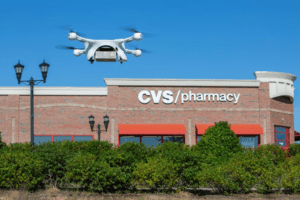 The use of drones for medical deliveries has been in place for some time. And with most of the country still on some sort of lockdown, it is showing more promise than ever. UPS will use drones to fill prescriptions for residents of The Villages in Florida, one of the country’s biggest retirement communities. The deliveries, which are scheduled to begin in early May, will come from a CVS store about a half mile away. This will mark the first paid residential deliveries by UPS’s drone unit Flight Forward, which received approval last year to. The drones will drop the prescriptions to a central location, where a Flight Forward employee will ferry them by golf cart to homes.
The use of drones for medical deliveries has been in place for some time. And with most of the country still on some sort of lockdown, it is showing more promise than ever. UPS will use drones to fill prescriptions for residents of The Villages in Florida, one of the country’s biggest retirement communities. The deliveries, which are scheduled to begin in early May, will come from a CVS store about a half mile away. This will mark the first paid residential deliveries by UPS’s drone unit Flight Forward, which received approval last year to. The drones will drop the prescriptions to a central location, where a Flight Forward employee will ferry them by golf cart to homes.
Speaking of drones, the North Carolina Department of Transportation (NCDOT) is preparing to launch a public-private partnership that will use drones in coronavirus-related relief efforts. The initiative is scheduled to launch in May and will use drones to deliver goods such as food and critical medical supplies. There are a few pieces to the plan. In the Charlotte area, Novant Health and Zipline are proposing to distribute PPE and other medical supplies across Novant Health’s medical campuses. In Winston-Salem, UPS Flight Forward and Matternet are proposing to work with a local hospital to use drones to deliver health care equipment, medicine and PPE to medical providers. In Holly Springs, Flytrex proposes to shuttle food from restaurants in a shopping center to nearby neighborhoods.
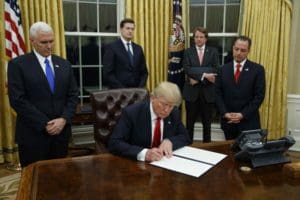 The Trump administration notified Congress on Friday that the US-Mexico-Canada Agreement will take effect on July 1, bringing to a close an almost three-year process that President Donald Trump began in rewriting the 25-year-old NAFTA. There are still some moving parts that need to be wrapped up, but the clock has started moving for the deal to go into effect. There has been plenty of pushback from North American businesses calling for the deal to be pushed back given the uncertainty of the economy due to coronavirus. But as of now, the deal is a go, and will begin a new era of North American trade.
The Trump administration notified Congress on Friday that the US-Mexico-Canada Agreement will take effect on July 1, bringing to a close an almost three-year process that President Donald Trump began in rewriting the 25-year-old NAFTA. There are still some moving parts that need to be wrapped up, but the clock has started moving for the deal to go into effect. There has been plenty of pushback from North American businesses calling for the deal to be pushed back given the uncertainty of the economy due to coronavirus. But as of now, the deal is a go, and will begin a new era of North American trade.
That’s all for this week. Enjoy the weekend and the song of the week, Radiohead’s Anyone Can Play Guitar.


















